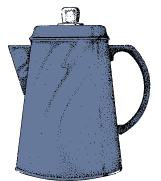
Breakfast
The inoffensive cornflakes seemed to
wilt under his very glance, crunchy as they
remained in milk. We had used the last oatmeal
for cookies the day before and were trying to
make-do with cornflakes just once. Josiah
enjoys his breakfast more than any other meal.
Of course we grew up in the days of real
breakfasts. There was none of this juice, coffee
and sweet bun gulping then. Getting
up at four A.M. is unusual today unless you are
going fishing. However, cows had to be hand
milked, livestock fed, and odd chores done before
the day's work got under way in those days. So,
while Father and the boys did chores for an hour
or two, Mother and the girls had time to whip up a bit of
breakfast. In the barn, dimly lit by oil lamps
hung from the rafters, cows lowed softly in
greeting. They chewed contentedly on fresh hay
or silage as they were milked. The barn cats
enjoyed their drink of warm milk and retired to
the hayloft to rest after a busy night of
hunting. Usually there was one clever clown
among them who had learned to catch a stream of
milk directed at him straight from the
cow. When the men returned
from the
barn with a pail of fresh milk, breakfast was
ready. There was "Arbuckles" coffee for everyone
well laced with warm milk for the children. No
juice, for oranges were a great delicacy and not
for everyday consumption. There might be fresh
or canned berries, peaches, pears, or perhaps fried apple
slices. Plates were
filled with fried potatos and steak (2 pounds for
25¢), or lightly browned
slices of ham and hot,
light biscuits or corn bread with 'lasses or
honey. From a heavy black iron kettle came bowls
of oatmeal or cornmeal mush to be eaten with
gobs of butter and brown sugar. When Aunt Bea made pancakes
for her large family, she used two pitchers of
batter. Cousin Julia has told of one rainy
morning when she held an umbrella over her mother
to protect the pancakes (and Aunt Bea) from a
leaking roof. I can imagine the merriment that
sweetened those cakes better than the homemade
maple syrup, for the strapping boys of all sizes
who lined Aunt Bea's table loved a joke,
especially when it was on themselves. To top off the energy
packed meal, formerly eaten at dawn's early
light, you had your choice of pies, cookies, and
possibly fried cakes. Then it was time to begin
the real work of the day, though it would seem
you would be more ready for a nap to help your
digestion. When the breakfast dishes were
washed, the table was reset. Plates were
replaced upside down, leading at least one small
girl to believe "grace" was printed on their
backs, and cups and glasses were also upended.
Over the whole table, tented by the tall silver
caster with its jars of salt, pepper, oil,
vinegar, and mustard, a heavy cheesecloth was
laid. The table was ready for dinner. One of the most memorable
breakfasts of my childhood, Grandpa and I caught
in the creek on the Big Farm. The path was well
worn so we needed no light other than the fading
stars to show us the way. In the pasture lot the
cows rose from their sleeping places and began
browsing their way toward the barn. Small wild
creatures scurried through the hedgerows
returning late to their homes from the night's
excursions. The creek murmured briskly, endless
and untiring, its black water touched with silver
as the wavelets broke in the growing light.
Damp, mossy logs were our seats, water worn rocks
our footstools as we cast our simple lines and
caught the "mess of fish" that would be our
breakfast. Rolled in egg and cornmeal and fried
in Grandma's iron spider, those fish were fit for
a king. The boys who
slept
overnight in the sugar shed during the sap run
usually made their own breakfast. Golden-eyed
fried eggs, rashers of bacon, cornbread, and
coffee strong enough to melt a silver spoon, all
were flavored with the mapley aroma of the
boiling sap. Fat molasses cookies as big as
saucers and studded with raisins were part of the
breakfast I shared with my cousins one brisk
March morning. The very idea of inflicting such
a heavy burden on one's stomach in the early
morning hours is a bit unsettling today. We
enjoy our fruit juice, oatmeal, coffee and
cookies and the memories of those other feasts of
our younger years.
(
Josiah sat glowering into
his
cereal bowl as I
walked into the kitchen for breakfast.
"How in
tunket do you expect me to eat this, Martha?
Where is my oatmeal? Katy, why can't I have
oatmeal for m' breakfast like a civilized human
being?"
![]() Flapjacks,
griddlecakes, flannel cakes, or
pancakes are all the same basic recipe and
sometimes replaced the potato at breakfast. At
hog butchering time there would be fresh sausage
to go with them.
Flapjacks,
griddlecakes, flannel cakes, or
pancakes are all the same basic recipe and
sometimes replaced the potato at breakfast. At
hog butchering time there would be fresh sausage
to go with them.




![]()

![]()

